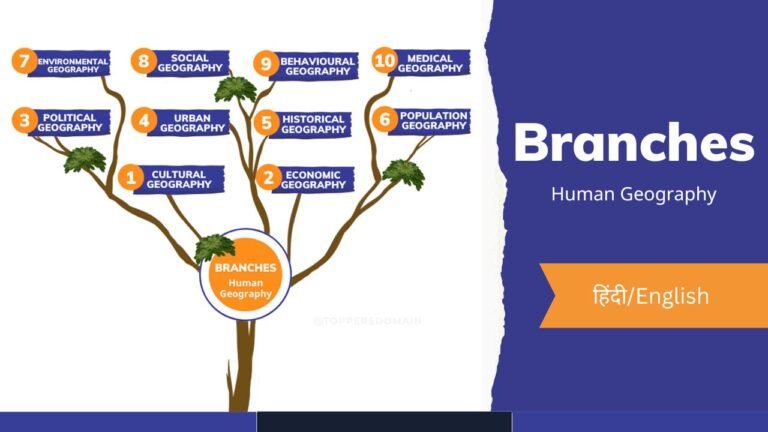Contemporary Relevance
Human Geography
Index
Contemporary Relevance of Human Geography
Human geography is a branch of Social Science that studies human interactions with the environment and the human activities, patterns of land use and cultural diversity. It aims to understand how people interact with each other and their surroundings.
Human geography examines the various factors that shape the way we live, such as culture, economics, politics and the environment. It is also concerned with the spatial distribution of various social and cultural phenomena. It examines how these activities and phenomena vary across time and space. In the contemporary world human geography has its relevance in many ways.
- Natural Resources
Human geographers study the spatial distribution of natural resources, patterns of land use, and the impact of human activities on the environment. Climate change, resource depletion, and environmental degradation are some of the most pressing challenges facing the world today. Human geography plays a crucial role in understanding the causes and consequences of these challenges and developing solutions to mitigate their impact.
- Urbanization
Urbanization is a global trend that is transforming the way people live and work. Human geographers study the social and economic processes that underlie urbanization, including the growth of cities, patterns of migration, and the impact of urbanization on the environment. They also examine the challenges facing urban areas, such as poverty, inequality, and environmental degradation, and develop strategies to address these challenges.
- Cultural Diversity
Human geography has a strong focus on cultural diversity and the ways in which people's beliefs, values, and practices are shaped by their environment. Human geographers examine the spatial distribution of cultural groups, patterns of migration, and the impact of globalization on cultural diversity. They also explore the ways in which cultural diversity contributes to social and economic development and develop strategies to promote cultural diversity and tolerance.
- Climate Change
Human geography helps us understand the causes and consequences of global environmental change, such as climate change, deforestation and desertification. Human geography provides insights into how human activities are contributing to these changes.
Climate change is caused by human activity and human geographers can help identify the social, economic and political factors that contribute to climate change, as well as the potential solutions that can mitigate its impact.
- Impacts of Globalization
Human geography is important for understanding the social and economic impacts of globalization and other international developments. As the world becomes more interconnected, it is essential to understand how different societies and cultures interact with each other and how these interactions impact economic development, social relations and political power.
It also helps us understand how economic and cultural globalization are changing the spatial distribution of economic and social activities and how these changes are affecting the environment.
- Environmental Problems and Sustainable Development
The study of human geography is essential for developing sustainable solutions to environmental problems. human geography is essential for designing sustainable development policies and practices. It provides insights into how economic, social and environmental systems interact and how we can design policies and practices that promote sustainable development.
In addition to its relevance to environmental and social issues, human geography is also essential for understanding the spatial patterns of economic activity and for developing effective strategies for economic development. Economic geography can help identify the factors that contribute to regional economic growth and can inform policies that promote sustainable and equitable economic development.
- Social Inequality
Apart from that, human geography is important for understanding the spatial distribution of social inequalities and how these inequalities impact the human society and also the environment. It helps to understand how social, economic and political power is distributed across space and how this impacts access to resources and opportunities.
Conclusion:
In conclusion one can say, that the study of human geography is increasingly relevant in the contemporary world, as human activity continues to shape the environment and impact natural resources. It is also relevant today because it helps us understand the causes and consequences of global environmental change, the social and economic impacts of globalization and the challenges and opportunities of sustainable development. It also provides insights into the spatial distribution of social inequalities and their impact on the environment.
Share
Other Topics
Unit - I




